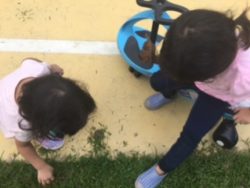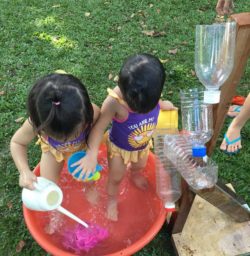I’m featuring a question from a concerned mom of a preschooler. Here it is:
Q: Teacher Tanya, why is play important to my child’s development? How can I be sure that my child is learning when she’s just playing at home or with her friends?
A: Thanks for sending your question. I always get the same concern from most parents in the preschool. The answer that I always tell these parents are: by letting your child play, you are actually developing foundational skills that will prepare him later on in life. Let me explain more.
First of all, do you know that play is the work of childhood according to Jean Piaget ( a very popular psychologist who pioneered theories in child development). It comes naturally for every child, you don’t teach a child how to play. It’s an automatic gesture for every child to take a toy and explore it in whatever way he wants to. That’s self-directed play: spontaneous, and real, and natural. It is through these kind of experiences that a child learns best. Not through rote, but through actual hands-on experiences.

Second, play is the primary way that they explore, learn, discover and communicate. It also becomes a venue to release emotions and facilitates regulation of emotions. Have you noticed your child who’s simply not in the mood for that day, he would feel better when he starts to play? I’m always amazed with how play affects a child emotionally.

Because your child has an opportunity to express what he feels, he becomes psychologically strong and feels safer in the world. Wouldn’t you want a child who is resilient, motivated and confident in life?
When you see your child cooking using her play objects, or acting out a script or story with another friend, that’s dramatic play or pretend play. It gives your child a chance to show compassion and empathy towards others, to share and negotiate. As he acts out real scenarios from everyday life, it engages your child into reality and a better understanding of the world that he lives in. Wouldn’t you want a child who is able to interact well with others and in touch with what’s happening around him?

Do you know that what may initially seem as a silly game or song is already stimulating and initiating intense thought activity in your child’s brain. Studies have shown the connection between play and brain development and the results revealed that play supports a child’s intellectual development because it facilitates problem-solving and imagination. It helps create neural pathways that not only develops creativity but also develops other cognitive skills such as: remembering details and making connections. Dr. Sergio Pellis of the University of Lethbridge, Canada explains that play allows the changes in the connections of the brain neurons which wires up the brain’s executive control center (the one responsible for regulating emotions, making plans and solving problems). He added that play is what actually prepares a “young brain for life, love and even school work“.

With our children, nothing beats real, relevant and meaningful experiences that awaken the senses and engage the child completely. Rae Pica, author of the article “In Defense of Active Learning” (2008) which was published in the journal of the National Association for Education of Young Children, stresses that rote learning is merely a result of memorization while authentic learning involves comprehension. “And until a child is developmentally ready to understand what the numbers, letters, and words he’s reciting represent—until the information has some relevance to his life—there will be no comprehension.” She further states that “active, authentic learning, on the other hand—the process of exploration and discovery, of acquiring knowledge,of knowing how to acquire it —will serve a child endlessly.”
But the greater concern of most parents is: Does my child really learn when he’s just playing? My answer to that is a YES. Absolutely YES. They are not just playing. They are actually learning best through play. It is authentic learning, through active play, that leads a child to become an individual who has taken the learning process beyond seatwork and passive play.
Here’s a video of my children at play.
I believe that this play is what every child of today, really needs. It’s more complicated to be a child now than before and even more challenging to be a parent too. We deal with stress, traffic, less face-to-face connection and more driven to be “indoors” than outdoors; then all the more our children are in need to opportunities that allow them to meaningfully experience the world. It is through play that they become more connected to themselves and with others as well. Whatever our children learn in play, they will definitely bring with them as they grow up.
Play is their work at the moment and hopefully in the future, when they get to become adults, whatever they do becomes enjoyable and meaningful as play.
Let’s make it a point to play with our children, everyday.
Teacher Tanya
Source: https://www.naeyc.org/files/yc/file/200811/BTJActiveLearning.pdf
http://www.npr.org/sections/ed/2014/08/06/336361277/scientists-say-childs-play-helps-build-a-better-brain


Comments are closed here.